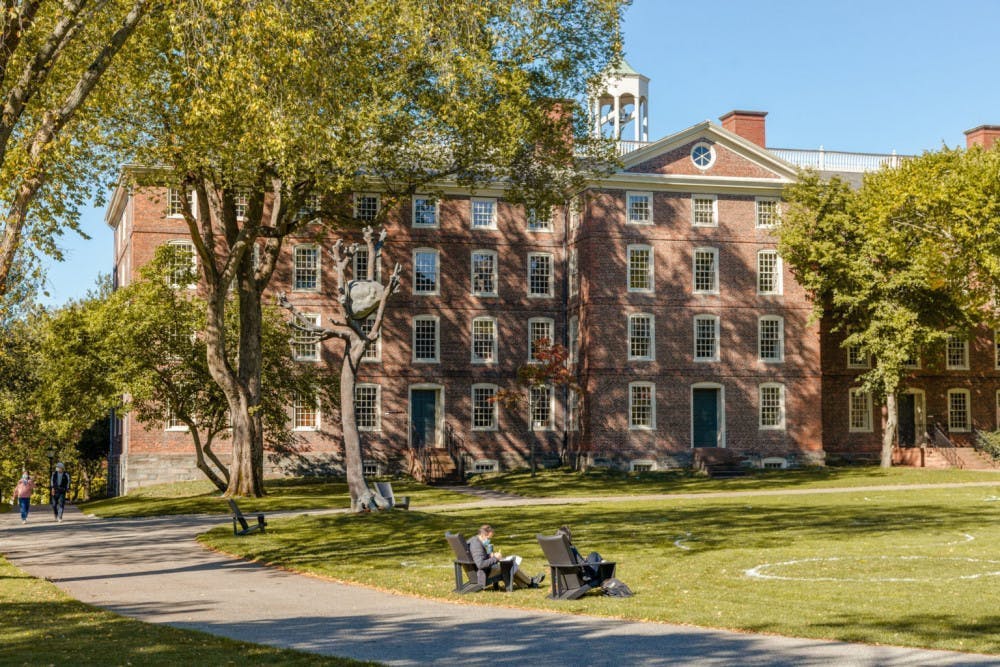The University will suspend a proposed Administrative Support Network — which would consolidate administrative support staff between multiple similar departments — in response to faculty discontent, Provost Richard Locke P’18 announced in a Monday email to faculty that was reviewed by The Herald.
The proposal would have combined administrative staffing for “the seven modern languages, literatures and cultures departments,” according to the announcement. Currently, each academic department at Brown has its own unique administrative support network.
Upon the initial release of the proposal, faculty members from multiple departments expressed concern that the consolidated Administrative Support Network would lead to insufficient personalized departmental support as it currently exists.
In response to the proposal, more than 135 faculty members signed a letter of concern expressing their discontent, said Associate Professor of German Studies Kristina Mendicino, who served as a “point person” in organizing faculty response to the proposal.
“We have studied the plan carefully, discussed it at length with many colleagues across the campus, as well as with colleagues at peer institutions,” the letter, which was reviewed by The Herald, said. “A consensus has emerged far and wide that this plan does not represent a desirable path forward — neither for the particular departments involved, nor for Brown as a whole.”
Faculty discontent also partially stemmed from a perceived lack of transparency from the University. Initial recommendations for the networks were made by the Academic Shared Services Working Group in February 2021, but language department faculty members were only informed of the plans on Nov. 1, 2021.
“Faculty, staff and students from the humanities departments that would be directly affected by the pilot ‘Academic Support Network’ were not consulted before the decision to move forward was reached,” the faculty letter explained. This contradicts “Brown's long-established principle of shared governance and (fails) to maintain so much as a semblance of democratic procedure.”
The network would have been implemented in January 2022, a timeline which the faculty felt did not give them enough time to “provide the feedback we needed to provide,” according to Mendicino.
Locke acknowledged the fault in communication following the suspension. “We did not do a good job communicating our plans with faculty and staff,” he wrote in an email to The Herald. “We have to take the time and engage faculty and staff in these discussions long before we roll them out, make sure that there is buy-in, clarify any misunderstandings there may be. This is what we hope to do in the near future.”
In the meantime, Locke wrote in Monday’s email that the University will collaborate with faculty and staff to discuss an alternative administrative support network.
History of proposed network
The network was first proposed by the Academic Shared Services Working Group in February 2021. The proposal cited a 2016 Staff Climate Survey that found that only 51.9% of University staff members felt they were treated with respect by faculty, according to a presentation given during a Nov. 18 Humanities Chairs and Directors Meeting reviewed by The Herald.
The working group suggested formalizing existing “informal networks of support based on administrative tasks” and “creating opportunities for specialization and career advancement,” as well as providing “more robust staff support for faculty in (department) leadership roles,” according to the presentation.
This proposal aligned with the final report from the Ad Hoc Committee on Promoting Financial Health and Sustainability, which recommended the formation of “centers of excellence” in which “departments engage a pool of shared staff members who are skilled at a specific transaction,” rather than maintaining roles with overlapping responsibilities, according to the report.
University finances did not motivate the infrastructure change, Locke wrote in an email to The Herald. “We were launching this initiative not to reduce costs or headcount … but rather to create job enrichment and career opportunities for staff,” Locke wrote. “As we moved from recommendations to implementation, we realized that in fact, there would be no cost savings tied to this initiative since we were upgrading jobs that paid higher salaries.”
The working group suggested the creation of a pilot program in which one professional staff member would oversee two or more comparable disciplines, according to the working group’s report. As a result, the University chose to join the German Studies, French Studies, Hispanic Studies, Portuguese and Brazilian Studies, Slavic Studies, Italian Studies and Comparative Literature departments under the cluster of Modern Languages, Literatures and Cultures.
Four new administrative positions would oversee the cluster, according to the Nov. 18 presentation: an events and communications manager, a graduate student affairs manager, an undergraduate student affairs manager and a finance and administration manager.
The program’s implementation would have coincided with a number of staff retirements, according to the report by the Ad Hoc Committee on Promoting Financial Health and Sustainability. Eighteen staff members are set to retire by the end of 2021, the vacancies from which would not be filled; those who remain would have been integrated into the new structure.
Given the suspension of the program, the University will also “fill all department manager positions that will soon be vacant to ensure there are no interruptions in administrative support,” Locke wrote in his letter to faculty.
Faculty discontent
Faculty challenged the notion that the proposed network “is not part of an effort to collapse all seven departments into one academic unit,” as stated by the presentation.
“It seems to me that the distribution of labor which the rest of the document describes establishes the operational and material conditions of exactly such an umbrella ‘unit,’ even if individual departments would be left in name,” Mendicino wrote in an email to The Herald.
According to the presentation, the network “is not a reduction in staff support: In fact, it enhances administrative support to the departments.” But faculty expressed concern that the administrative responsibilities of seven departments, if held by four individuals, would result in burnout and poor performance.
“These administrators are going to be overburdened with the work of serving seven departments at a time,” Mendicino said. “At the same time, it's very possible that things could fall through the cracks.”
The presentation noted that the networks would not “centralize staff support that would depersonalize relations between faculty and staff,” but instead would allow “collaboration between a wider group of faculty and staff in a circumscribed structure embedded in the departments.”
Still, faculty expressed concern over the potential for depersonalized advising services, specifically for undergraduate students.
The draft of the job description “for the Undergraduate Student Affairs Manager … says explicitly that the … manager would assist us in providing guidance and orientation for undergraduate concentrators,” Mendicino said. “Some of the advising … would involve an administrator who might be located in another building, serving seven different departments and without the organic institutional memory of the concentrations.”
Current staff “see our students every day, so if a student has a question about something, (our staff) knows these students,” Mendicino said. “With this network, I don't even know if it would be possible for one administrator to know all the concentrators well across seven departments. … Students would be negatively affected by this.”
Faculty also expressed concern that the scattered locations of the staff filling these new administrative positions would lead to communication barriers.
In this system, “it might be that the undergraduate student manager is located in another building across campus,” Mendocino said.
Looking ahead
Going forward, Mendicino said that she hopes the University will be more receptive to faculty feedback.
“What I took from (Locke’s) email is that there will be follow-up conversations with faculty,” Mendicino said.
“I still hope that we don’t end up with a new organization that resembles the support networks because the structure … is something that I don’t think would work for the small departments in the modern languages,” Mendicino added. “But that’s something that is going to have to come up in future conversations and be addressed in detail.”

Alex Nadirashvili was the managing editor of multimedia and social media for The Brown Daily Herald's 133rd Editorial Board. As a former University News editor, he covered faculty, higher education and student life, though his proudest legacy is The Brown Daily Herald TikTok account.
Caleb Lazar was the senior editor of data desk for The Brown Daily Herald's 133rd Editorial Board.





